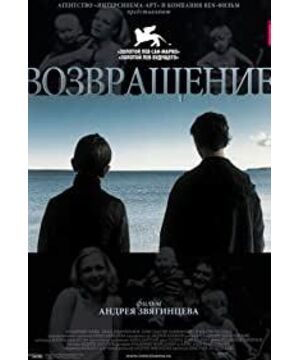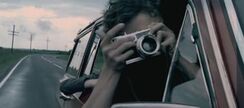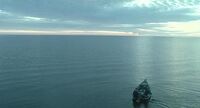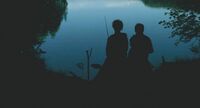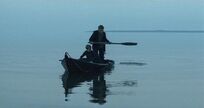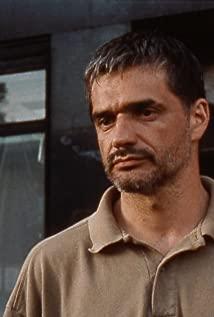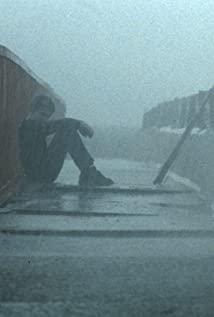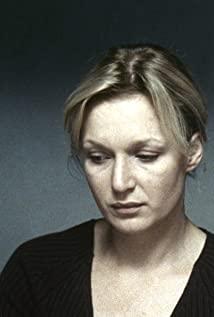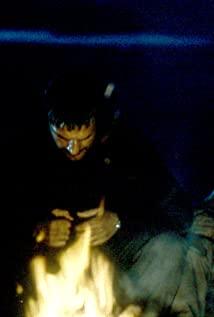The film "Return" is the first feature film of Russian young director Andrei Zviadintsev. It won two awards at the 2003 Venice International Film Festival in the main competition unit and the debut unit. After that, it has been continuously performed in other parts of the world and in Russia. China has won more than 20 awards in film festivals and awards. Film sales are also good. During the Venice Film Festival, many countries have directly requested screenings. Later, the film was released in many countries around the world, making this film with an investment of only 400,000 US dollars a double harvest in art and business, and also making Russian films return to the world film scene since the 1990s.
"Return" attracted a lot of attention during the Venice Film Festival, and the positive comments of various newspapers: "The mystery that cannot be guessed gives the film an extra charm and poetry. The film is a great debut." "The film does not Touching on social themes, but showing a mythical attitude towards life" etc. The comment of the Venice Film Festival’s jury was: “A film about love, loss, and adulthood that is difficult to describe but cannot be rejected.” International Film Critics Society’s general secretary Klaus Adel said: “Why is it so successful? I don’t know. But the film is finished. It is very simple, and a good story is conceived in it. The director of the story is very good, and the actors are very good. Isn’t that enough?" Many critics wrote "Return "Compared with Polanski's "Sword in the Water" and Tarkovsky's "Ivan's Childhood", we can see the cherishment of it.
The film won the first prize in Venice, and Russia was full of jubilation. The national television station said: "This marks the return of Russian cinema to world culture." The famous film theorist Razlogov also proudly said in the radio program: "Russian film Finally returned, and it is important to have a new generation of directors." Not only the film industry, President Putin also pays attention to directors. In 2004, when Putin went to attend a meeting of major leaders of the film industry held at the Moscow Film Studio Group Company, he specially invited Zvyatintsev to go with him in his car. He was sitting next to him during the meeting, which shows his support for the young director. .
As an art film, "Return" has been so affirmed for several reasons. First of all, as far as the title is concerned, it has multiple meanings: First, the return of the father is a real thing that naturally exists. The second is the return of the father-son relationship. Because of the long absence of the father, the father-son relationship is extremely abnormal, especially the attitude of the second child after seeing the father. But after the father's death, the child confessed to his father, and the father-son relationship really returned. Third, the creation of Russian films has returned to tradition. Not only do Russians believe that "Russian film creation has finally returned in this period", German film critic Gans also believes: "For the first time in many years, Russian films do not try to imitate American combat films, but return to their own traditions of the 1960s. Zvia Jintsev made a very modern film, not because of fashion, but because of a return to the great Russian film tradition."
Secondly, the film story is extremely simple, but full of morals. It looks like a hiking story, but the actual content is the exercise and training of the father to the child. The father, who did not live with his children for some reason, suddenly returned home and decided to train his two sons to become real men within a week. During the trip, the father deliberately set up some life obstacles, or played some games to cultivate survival ability, in order to exercise the children's strong character and ability to adapt to survival. Father's education is strict. He often yelled at his two sons, and beat him a few times from time to time. As for the son, he doesn't care much about the father who only sees the appearance in the photo, and sometimes even disgusts him, especially the younger son. Not only does he not listen to his father, he also protests with silence from time to time. However, after the death of his father, the children on the deserted island were not intimidated. They matured, and his father's actions and hopes were not in vain.
The film shows the relationship between father and son with new ideas. As we all know, the relationship between father and son is an eternal theme in Russian literary creation. In modern literary creation, there is often a theme of not having a father and looking for a father on the relationship between father and son. The Russian film "The Thief" (also translated as "The Thief") shows the theme of finding a father. Because for every man, youth, and little boy, the father’s problem is always an urgent problem. Children who grow up from single-parent families are easily paranoid in character, or unscrupulous, or a little cowardly. That's why. In the film, the father's return after 12 years is to cultivate his son's masculinity and make up for his lack of affection for his son over the years. But their way of communication is based on blunt violence and suppressing the will of others without resistance. Suppression and resistance have become the cause of conflict between the people in the play.
It can be said that the conflict between father and son has almost reached its limit in the film. For the younger son Ivan, the appearance of his father brought him pain, grievance and fear. Before that, his brother Andre was his closest person, and with the appearance of his father, his brother almost became his enemy. He obeyed his father everywhere, but Ivan couldn't. Ivan has no affection for his father, and his character is stubborn, like Andre said, like a donkey. Ivan's fear, exhaustion, stubbornness, distrust of his father and strong unyielding led to a deeper and deeper conflict between him and his father. In the end, he was thrown halfway by his father, drenched like a chicken.
The conflict between father and son continues to intensify, and finally turns into an irreversible ending. After a fierce quarrel, when his father saw Ivan climb the tower, he desperately rescued him. Unexpectedly, the wooden slats broke and his father fell and died. This scene shows that no matter what kind of person the father is, no matter what he comes to the island to do, but his affection for his son is true and he loves them. The sons also felt the father's true love from it. When the father sank into the water, he shouted "Dad" with tears in his eyes. The problem of the father and the son is now resolved, and the relationship between the father and the son has returned to normal, but at a high price.
The story told by the film does not specify the time and place, that is to say, the story can happen at any time and in any country. Secondly, the story of the film takes place in the seven days of Genesis in the Bible. Several scenes in the film are related to the Bible. When the children saw the sleeping father for the first time, he slept like a dead man, like a dead Jesus Christ. This scene seems to herald the final death of the father, but at the same time, because the image of the father overlaps with Jesus, the father suddenly has the power of spiritual authority. At the end of the film, the father looks like the dead Jesus in Monet's painting. What's interesting is that when these shots appeared on the screen in Venice, there was a scream of "Monet" in the hall. There is also a scene in the film, that is, the family portrait photos kept at home are sandwiched in the "Bible". And the father’s training process for his children from Sunday to Saturday was also Ivan’s fear of heights from playing high platform diving at the beach, and finally he used rebellious psychology and courage to break through fear and actively climbed up the platform to affirm himself. process. After his father died, Andre took the initiative to take on the role of his father, calmly and calmly instructed Ivan to move his father's body together, indicating that the children became real men.
The film is full of symbolism and mystery in terms of expressing the meaning of thoughts. This is also an important factor in the film's recognition, and it is also the director's innovation. The script of the film was originally a genre film with a treasure hunt plot. When the father took his son to find the black box on the mysterious island and returned, he was taken away with all his belongings on the way, leaving only the two brothers to go home. In the film, the director abandoned the final ending and changed the father's body and black box to accidentally sink into the water, which made the film more mysterious, and also increased the film's deep meaning, full of spiritual pursuit and artistry. Many times, the purpose of going to the island was not explained, and what was in the black box dug out with the child on his back. All of these not only maintained the film’s mystery, but also pushed the plot forward and constituted a narrative. Important aspects.
The styling of the film is also symbolic. In fact, the film has heralded the end of the tragedy right from the beginning. The high platform where the children play diving at the beach corresponds to the high tower that appeared on the island later, and the tragedy happened here. And the beginning of the film is a shot of a boat sunken in the water and the stern cable. This scene is reproduced almost exactly at the end of the film. Without any power, the boat leaves the shore, sinking the father’s body and his secrets. Into the water, this is undoubtedly a sign.
In addition, the mystery of the film is also hidden in the unique location. The story of the film takes place in a small town far from the city. The place where father and son hiked is a deserted island. This primitive wilderness far away from the town itself has a sense of mystery and fear, and the black box his father dug in it adds to his sense of mystery and suspense.
The shape of the film is also distinctive. The seemingly simple composition is full of modernity. For example, the two towers in the form of structuralism (the beginning and the end of the film), the photographer used different points when shooting. The panoramic view of the lake with different close-ups, especially the panoramic view when standing on the top of the tower and looking around. In addition, Ivan is sitting on a dead tree trunk that stretches out into the lake and fishing. The author uses different angles to express the lake surface, which fully reflects the artistic conception of water and sky connected. The rhythm of editing and pasting seems to touch a memory of idolatry in a strange way. What we are watching is not a movie, but a kind of ceremony, some kind of secret memorial ceremony. There is no doubt that the whole story takes place today, but it gives people a feeling of permanent projection. From this point of view, the film's recognition of people is quite incomprehensible.
Because it is a hike, most of the film was shot on location. When the photographer reproduces the natural scenery, he reproduces the beautiful scenery of nature with a new perspective, which is both magical and mysterious. The sea, lakes, forests, wilderness, rainstorm, and waterfalls reproduced with meticulous composition in the film not only reflect the beauty of the ingenious workmanship, but also reproduce the harmonious charm of the Russian natural landscape, giving people an immersive feeling. The people in the play seem to be integrated with nature, and they are inseparable from nature.
Another feature of the film, that is, the first film, its creators are almost all of the first creation. The director Zviadintsev made the first feature film, Dmitry Lesnevsky was the first blockbuster producer, and the "RenTV" company also produced the first film. Even the actors are ordinary actors with little-known names. Zviadintsev was born in Novorossiysk and studied at the State Academy of Drama of the Russian Federation. After graduation, he worked as an actor and participated in theater and film performances. He is deeply influenced by the works of Tarkovsky, Bresson, Bergman, and Kurosawa. He has made two short films. "Return" is his first feature film and his second work "Exile" In 2007, he won the Best Actor Award at the Cannes Film Festival.
The actors of the two protagonists in the film were still middle school students when the film was filmed. In the film, the actor of the elder brother Andre, Vladimir Garin, was born in St. Petersburg in 1987. He likes music, and his major is piano and horns. He has participated in performances at the Petersburg State Musical Theater and dubbed cartoons. Sadly, on June 25, 2003, Garin and his friends drowned when they were swimming in a lake on the outskirts of Petersburg. When accepting the award, the director said: I will dedicate the honor of this award to Galin.
The younger brother’s actor, 14-year-old Ivan Doboron Lavov, participated in the "Satire" theater performance during school, and also appeared in two films "Explorer" and "Tega-Class of Survival" Role. The performances of the two young actors are accurate and moving, especially the young Ivan has a bright personality and full of personality. They tightly grasped the audience's sight and deeply moved the audience's heart.
Constantine Lavronenko, an actor in the "Satire" theater, plays the role of his father. He does not speak much in the film, and is extremely serious, even harsh. He is a person who does not understand, but he has a wealth of life experience and loves children deeply.
In general, the movie "Return" tells a permanent theme with a new perspective and mysterious language. The film has not only won the unanimous affirmation of the critics, but also won the recognition of the audience.
View more about The Return reviews


